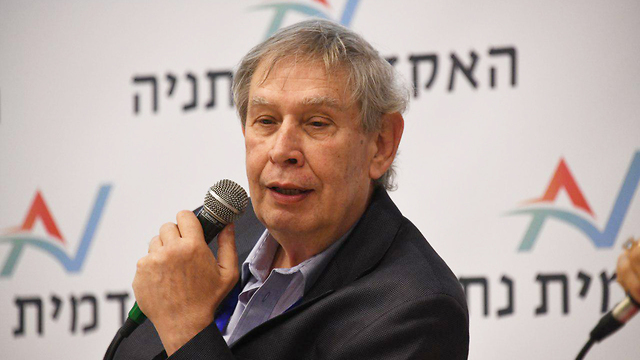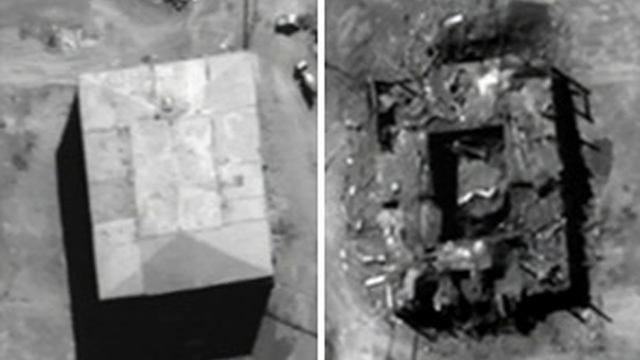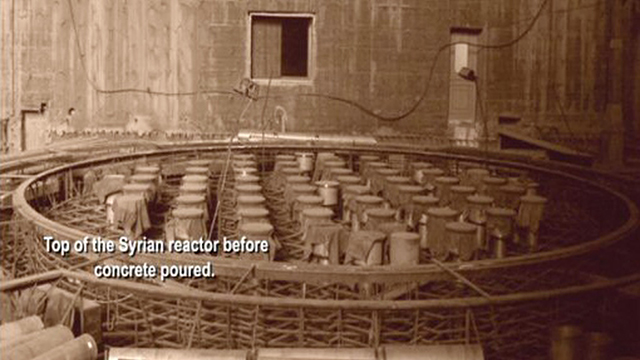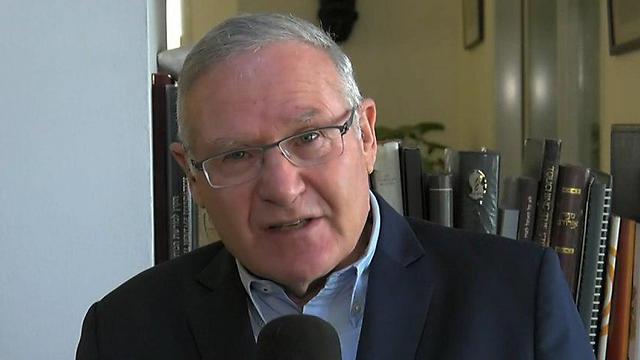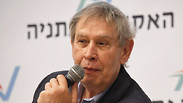

Former Mossad chief rips Israel's 'failure' in Syrian reactor case
Tamir Pardo, who headed the intelligence agency from 2011 to 2016, says 'spectacular failure' in Israel's initial and belated handling of the Syrian nuclear reactor was only mitigated by information that was 'luckily' obtained by Mossad agents.
“It was only thanks to this information that the State of Israel had the knowledge that there actually was a reactor in Syria," Tamir Pardo said at the Netanya Academic College, noting that the information had been received more than five years after Syria had started building the reactor.
"On the one hand, there was a spectacular failure here. We're lucky that a handful of fighters managed to bring this information which no one knew existed. We're very lucky," he stressed.
According to Pardo, the Mossad was placed in “the shadow of a shadow” for reasons relating to censorship.
When the reactor was attacked and destroyed by Israeli jets in 2007, the late Meir Dagan headed the Mossad. Pardo replaced him in 2011 and presided over the intelligence unit until 2016.
Before that, he served as Dagan’s deputy and between 2006 to 2007, and was temporarily put into military service.
“A crew of Mossad fighters managed to bring the intelligence and it knew how to do that, but I won't elaborate here,” he said, admitting that the intelligence was gathered five years after construction of the reactor had begun.
“The moment that the information was known, the entire Israeli security establishment was enlisted—the IDF, the Mossad, the Shin Bet and the Foreign Ministry. Shadow crews and others gave their advice and in time of pressure, the State of Israel knows how to enlist the best of its youth and to achieve a brilliant result carried out by the Israel Air Force (IAF) and under the command of the chief of staff,” he said.
Interviews: Attila Somfalvi, Yoav Zitun, Ron Ben-Yishai; Content editor: Noam Gil; Director: Assaf Cuzin; Camera: Yaron Sharon, Ori Davidovitch, Yogev Attias; Script, video editing, animation: Tamar Avraham; Production: Adi Berman; Content management: Noa Glickstein Keren.
Regarding the timing of the publication of what transpired in 2007, Pardo said he did not believe that it was "essential" that it be announced now.
“I am not sure that it was essential to make the announcement now. It could have been made eight years ago or in eight more years. The problem, usually, with successful operations is that Jewish or Israeli intellect tries to take the success and begins an exceptionally ugly war of egos," he said.
"But that seems to be our character and everyone tries to dwarf the other. I think that then-Prime Minister Ehud Olmert did exceptional work as a leader of the state and in bringing its abilities to the fore at the right moment,” Pardo said, before furnishing then-Defense Minister Ehud Barak with similar praise.
“I think that Ehud Barak did exceptional work in his job as defense minister and in bringing the forces to the right point. It’s important to remember that Israel was just a year after the Second Lebanon War, it was still licking its wounds and with chief of staff, deputy chief of staff and GOC Northern Command just finishing their jobs, of course an incident like that could have developed into a war," he said.
"Both Barak and Chief of Staff Gabi Ashkenazi handled the matter exceptionally well. Aside from them, there were many others. It was decided for censorship reasons, in a strange way, to put the Mossad into a shadow of a shadow.”
Pardo didn’t mentioned the competing intelligence bodies, but it appears some friction may have developed with the IDF’s Military Intelligence Directorate (AMAN).
Former head of AMAN, Amos Yadlin, told Ynet on Wednesday morning that “intelligence is a puzzle. To get an intelligence picture you need to connect a thousand pieces. Some of them come from human intelligence, some from satellites and eavesdropping. In 2006, in AMAN, and not in any other place, a young major came and said, ‘Head of AMAN, there’s suspicion of a nuclear program in Syria.’
“When I first became head of AMAN in January 2006, I said to them, ‘Friends, please check all the states in which there is no logic in them having a nuclear program and whether there is a nuclear program.’ Regarding Syria, the assumption was that it didn’t have any nuclear infrastructure, that it had no abilities, that it was occupied with other things and that the strategic balance with Israel was achieved by heavy chemical weapons," Yadlin said.
“Then in the summer of 2006, the same young major comes to me and says ‘Amos, I am not sure. I have 50 pieces out of 1,000.’ A part of a picture about some strange building that AMAN pointed to first, no one else,” Yadlin emphasized again.
“Logic said after 1981 that no one would create a reactor, and the Syrians and North Koreans pursued a very interesting program that no one had thought of at the time—to build a large hangar that resembled an agricultural building and a storage site, inside which they would build a reactor that a satellite was unable to detect, to hide it without anything protecting it.”














